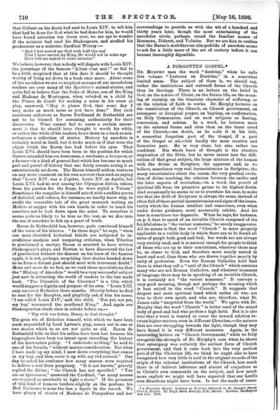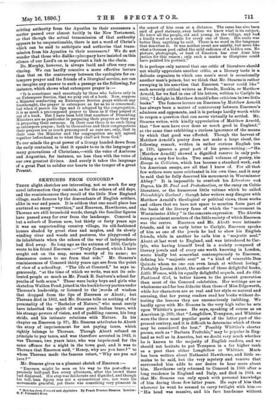A FORGOTTEN GOSPEL.*
Du. MURPHY uses the word " doctrine," when he calla this volume " Lectures on Doctrine," in a somewhat limited sense. The subject of them is, we should say, rather the institutions and outward forms of the Church than its theology. There is no lecture on the belief in God, on the nature of Christ, on the future life, on the mean- ing of eternity, on the vicarious character of suffering, or on the relation of faith to works. Dr. Murphy lectures on the constitution of the Church, on Church government, on extempore or liturgical prayer, on baptism, on confirmation, on Holy Communion, and on such subjects as fasting, conversion, and schism. In a word, he lectures more on the external forms and rites than on the inner creed of the Church,—no doubt, as he calls it in his title, a somewhat forgotten part of the Gospel, if a part of the Gospel at all,—but hardly the most creative and formative part. He is very clear, but also rather too confident. His whole basis of thought is the absolute inspiration of the Bible, but he never enters into the diffi- culties of that great subject, the large mixture of the human with the divine in Scripture, the apparent and, as we believe, sometimes very real inconsistencies in Scripture, the many uncertainties about the canon, the very gradual evolu- tion of divine teaching, the relation between the earlier and the later aspects of revelation,—in a word, the growth of spiritual life from its primitive germs to its highest fruits. And occasionally he seems to us to overstate his case, to make out that the drift of Scripture is always the same, instead of often fall of those partial inconsistencies and signs of the imma. tnrity which the human intellect and conscience, even when under divine guidance, must necessarily exhibit. And his tone is sometimes too dogmatic. When he says, for instance, on p. 8, that to speak of an invisible Church composed of the faithful alone is " the veriest nonsense," he sorely exaggerates. All he means is that the word " Church " is more properly applicable to a visible body in which there are to be found all sorts of people both good and bad; but words are not always very strictly used, and it is natural enough for people to think of those who act up to their convictions, whatever these may be, as closer to God, and therefore more nearly united in heart and soul, than those who are drawn together merely by unity of profession. Even the Roman Catholics hold that there is what they call a " soul of the Church " which contains many who are not Roman Catholics, and whatever looseness of language there may be in speaking of an invisible Church, it is certainly not " the veriest nonsense." It conveys a very good meaning, though not perhaps the meaning which is best suited to the word " Church." It suggests that deepest and most spiritual bond which unites all who are true to their own spirit, and who are, therefore, what St. James calls "unspotted from the world." We agree with Dr. Murphy that the word " Church " is better used of the mixed body of good and bad who profess a high faith. But it is also true that a word is wanted to cover the inward relation be- tween higher natures, even in different Churches,—the natures that are ever struggling towards the light, though they may have found it in very different measures. Again, in the interesting lecture on "Church Government," while we fully recognise the strength of Dr. Murphy's case when he shows that episcopacy was certainly the earliest form of Church government, and that it runs back into the very earliest period of the Christian life, we think he ought also to have recognised how very little is said in the original records of the origin of the external institutions of the Church, how much there is of indirect inference and almost of conjecture as to Christ's own commands on the subject, and how much more explicit we might well have expected that our Lord's own directions might have been. Is not the mode of trans- • A Forgotten Gospels Lectures on D•ctrine delivered in St. Georges Parish
Church, Bafast. By Hugh Davis Murphy, D.D., Rector. London: Bkeefington and Con. 1E96. mitting authority from the Apostles to their successors a matter passed over almost tacitly in the New Testament, so that though the actnal transmission of that authority appears to be unquestionable, there is not a word of Christ's which can be said to anticipate and authorise that trans- mission from his Apostles to their successors ? We do not wonder that those who dislike episcopacy have insisted on this silence of our Lord's on so important a link in the chain.
Dr. Murphy, however, is always lucid and often very con- vincing. We can hardly conceive a more effective lecture than that on the controversy between the apologists for ex- tempore prayer and the friends of a liturgical service, nor can we imagine any answer to such a passage as the following, for instance, which shows what extempore prayer is :—
" It is sometimes said sneeringly by those who believe only in an Extempore Service, that we pray out of a book. Now, suppose a Minister conducting an Extempore Service prays without any forethought, the prayer is extempore as far as he is concerned; but when it passes his lips and is adopted by the congregation, it is as much a precomposed prayer to them as if they prayed it out of a book. But I have been told that numbers of Dissenting Ministers are as particular in preparing their prayers as they are in preparing their sermons. In their case there is no such thing as extempore prayer ; both to themselves and their congregations their prayers are as much precomposed as ours are, only, that in their case the Minister and the congregation are not agreed together beforehand as to what they shall ask from God."
To our minds the great power of a liturgy handed down from the early centuries, is that it speaks to us in the language of many generations of Christians,—with the voice of Ambrose and Augustine, for instance, no less than with the voice of our own greatest divines. And surely it takes the language of a great Past to subdue our hearts to the temper of a great Present.







































 Previous page
Previous page